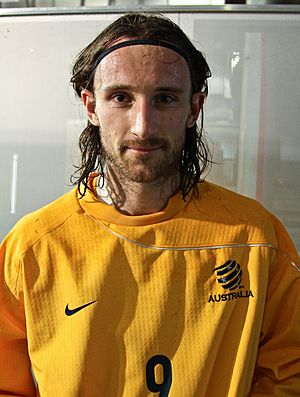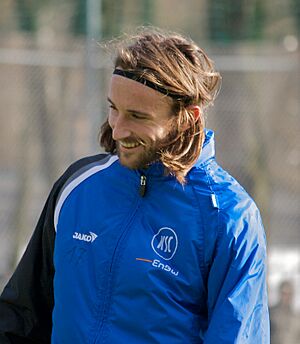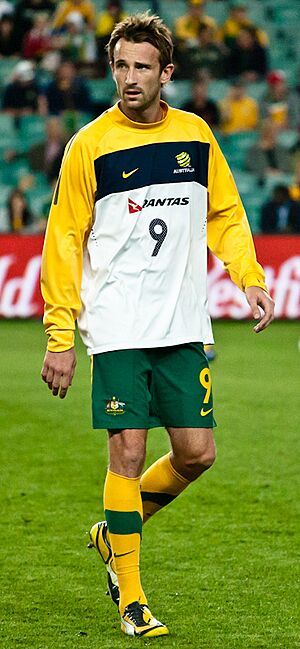Joshua Kennedy facts for kids

Kennedy with Australia in 2009
|
||||||||||||||||
| Personal information | ||||||||||||||||
|---|---|---|---|---|---|---|---|---|---|---|---|---|---|---|---|---|
| Full name | Joshua Blake Kennedy | |||||||||||||||
| Date of birth | 20 August 1982 | |||||||||||||||
| Place of birth | Wodonga, Victoria, Australia | |||||||||||||||
| Height | 1.94 m (6 ft 4 in) | |||||||||||||||
| Position(s) | Striker | |||||||||||||||
| Youth career | ||||||||||||||||
| Twin City Wanderers | ||||||||||||||||
| SS&A Boomers | ||||||||||||||||
| 1999 | AIS | |||||||||||||||
| Senior career* | ||||||||||||||||
| Years | Team | Apps | (Gls) | |||||||||||||
| 1999–2000 | Carlton | 4 | (0) | |||||||||||||
| 2000–2002 | VfL Wolfsburg | 8 | (2) | |||||||||||||
| 2002–2003 | Stuttgarter Kickers | 23 | (1) | |||||||||||||
| 2003–2004 | 1. FC Köln | 4 | (0) | |||||||||||||
| 2004–2006 | Dynamo Dresden | 60 | (16) | |||||||||||||
| 2006–2007 | 1. FC Nürnberg | 12 | (1) | |||||||||||||
| 2008–2009 | Karlsruher SC | 33 | (6) | |||||||||||||
| 2009–2014 | Nagoya Grampus | 133 | (64) | |||||||||||||
| 2015 | Melbourne City | 12 | (2) | |||||||||||||
| Total | 290 | (92) | ||||||||||||||
| International career | ||||||||||||||||
| 1999 | Australia U-17 | 9 | (0) | |||||||||||||
| 2001 | Australia U-20 | 14 | (7) | |||||||||||||
| 2006–2014 | Australia | 36 | (17) | |||||||||||||
|
Medal record
|
||||||||||||||||
| *Club domestic league appearances and goals | ||||||||||||||||
Joshua Blake Kennedy (born on 20 August 1982) is an Australian former professional footballer. He played as a striker, which means he was a forward player who mainly scores goals. He played for the Australian national team. For most of his club career, he played for teams in Germany and Japan.
Australian fans sometimes called Kennedy "Jesus." This was because his appearance, especially his hair, reminded some people of how Jesus is often shown in pictures.
Contents
Kennedy's Club Career Journey

Joshua Kennedy was born in Wodonga, Australia. He started playing junior football in the Albury/Wodonga area. He played for local teams like Twin City Wanderers and SS&A Boomers.
His talent earned him a scholarship to the Australian Institute of Sport (AIS). This led to his first professional contract with the Carlton club in 1999.
Playing in Europe: Germany
After one season, Kennedy moved to Europe. He joined the German club VfL Wolfsburg in 2000. He was only 17 years old when he played his first game for VfL Wolfsburg. This made him the youngest player ever to play for the club at that time.
He scored his first goal in Germany in 2001. After two seasons, he moved to Stuttgarter Kickers. He played 23 games there. The next year, he joined 1. FC Köln. He mostly played for their reserve team, scoring nine goals in 23 games.
Finding Success at Dynamo Dresden
In 2004, Kennedy joined Dynamo Dresden. This move was very important for his career. He quickly became a key player for the team. He played in all 34 league matches in his first season. He scored nine goals, making him the second-highest scorer for his club.
The next season, he continued to play well. He scored seven goals and helped set up four others. His strong performances caught the eye of 1. FC Nürnberg, another German club. They signed him to a three-year contract. The Australian national coach also noticed him. Kennedy was then chosen to play for Australia in the 2006 FIFA World Cup.
Sadly, in July 2006, Kennedy got a serious injury. He tore his Achilles tendon during his first training session with Nürnberg. This kept him from playing for a while.
Time with Karlsruher SC
In January 2008, Kennedy joined Karlsruher SC, another German club. He scored a goal in his very first game for them. He scored four goals in his first five games, which was a fantastic start!
However, after this great start, he didn't score for a long time. He lost his starting spot on the team. He later had some disagreements with his coach. After a few months, he was allowed to return to the team. He scored two goals in the final game of the season, but his team was still relegated from the Bundesliga.
Playing in Japan: Nagoya Grampus
In June 2009, Kennedy moved to Japan. He signed with Nagoya Grampus. He scored a goal in his first game for the team.
In 2010, Kennedy helped Nagoya Grampus win their first-ever league title. He was also one of the top scorers in the league with 17 goals. He was named in the J. League Best Eleven, which is like being on the "dream team" of the league.
In 2011, he continued his great form. He scored 19 goals and won the J-League Golden Boot award for being the top scorer. He was also named in the J. League Best Eleven again.
Return to Australia: Melbourne City
In November 2014, Kennedy signed with Melbourne City in Australia. He joined the team in January 2015. He scored his first goal for Melbourne City in a 3-2 win against Adelaide United. He scored another goal in a playoff game.
On 26 June 2015, Joshua Kennedy announced he was retiring from professional soccer. This was due to ongoing injuries. He finished his career with many achievements, including a J-League Championship, two J-League Golden Boot awards, a German Cup (DFB-Pokal), and 17 goals for the Australian national team across three World Cup campaigns.
Representing Australia: International Career
Joshua Kennedy played for Australia's youth teams. In 1999, he played in the U17 World Cup. In 2001, he played for the Young Socceroos (U20 team) in the Youth World Cup.
First Senior Appearances
Kennedy earned his first cap (played his first game) for the senior Australian national team in 2006. It was a friendly game against Liechtenstein, and he scored a goal with his head.
He came on as a substitute in Australia's first game of the 2006 World Cup against Japan. Australia won 3-1, scoring three goals in the last eight minutes. Kennedy was seen as a "secret weapon" because he was taller than the Japanese defenders. He also played as a substitute in Australia's game against Croatia.
Key Goals for the Socceroos
An injury kept Kennedy from playing in the 2007 AFC Asian Cup. However, he returned to the team and scored several important goals. He scored against Qatar, South Africa, and the Netherlands.
Under coach Holger Oseick, Kennedy played very well. He scored eight goals in just five matches. These goals included two against New Zealand, one against Thailand, two against Saudi Arabia, two against Malaysia, and one against Oman.
His most famous goal came on 18 June 2013. It was in Australia's last World Cup qualification match. He came on as a substitute and scored the only goal against Iraq with a header. This goal secured Australia's spot in the 2014 World Cup finals.
Because of this crucial goal, some Australian media called him a "saviour." They even made headlines like "Jesus Saves!" playing on his nickname and the famous Christ The Redeemer statue in Rio, Brazil. However, some people found these headlines insensitive, especially since Iraq is a Muslim nation.
Kennedy was chosen for the 2014 World Cup squad in Brazil. But, sadly, he had to leave the team before the tournament due to another injury.
Personal Life
Joshua Kennedy is married to Jacinta Hamilton. She is an Australian Opals player, which is Australia's national women's basketball team.
International Goals
Here is a list of the goals Joshua Kennedy scored for the Australian national team:
| No. | Date | Venue | Opponent | Score | Result | Competition |
|---|---|---|---|---|---|---|
| 1 | 7 June 2006 | Donaustadion, Ulm, Germany | 2–1 | 3–1 | Friendly | |
| 2 | 6 February 2008 | Telstra Dome, Melbourne, Australia | 1–0 | 3–0 | 2010 FIFA World Cup qualification | |
| 3 | 19 August 2008 | Loftus Road, London, England | 2–1 | 2–2 | Friendly | |
| 4 | 6 September 2008 | Philips Stadion, Eindhoven, Netherlands | 2–1 | 2–1 | Friendly | |
| 5 | 15 October 2008 | Suncorp Stadium, Brisbane, Australia | 4–0 | 4–0 | 2010 FIFA World Cup qualification | |
| 6 | 1 April 2009 | Stadium Australia, Sydney, Australia | 1–0 | 2–0 | 2010 FIFA World Cup qualification | |
| 7 | 1 June 2010 | Ruimsig Stadium, Johannesburg, South Africa | 1–0 | 1–0 | Friendly | |
| 8 | 5 June 2011 | Adelaide Oval, Adelaide, Australia | 1–0 | 3–0 | Friendly | |
| 9 | 2–0 | |||||
| 10 | 2 September 2011 | Suncorp Stadium, Brisbane, Australia | 1–1 | 2–1 | 2014 FIFA World Cup qualification | |
| 11 | 6 September 2011 | Prince Mohamed bin Fahd Stadium, Dammam, Saudi Arabia | 1–0 | 3–1 | 2014 FIFA World Cup qualification | |
| 12 | 2–0 | |||||
| 13 | 7 October 2011 | Canberra Stadium, Canberra, Australia | 2–0 | 5–0 | Friendly | |
| 14 | 4–0 | |||||
| 15 | 11 October 2011 | ANZ Stadium, Sydney, Australia | 2–0 | 3–0 | 2014 FIFA World Cup qualification | |
| 16 | 18 June 2013 | ANZ Stadium, Sydney, Australia | 1–0 | 1–0 | 2014 FIFA World Cup qualification | |
| 17 | 16 October 2013 | Craven Cottage, London, England | 1–0 | 3–0 | Friendly |
Achievements and Awards
Team Awards
1. FC Nürnberg
- DFB-Pokal (German Cup): 2006–07
Nagoya Grampus
- J1 League (Japanese League): 2010
- Japanese Super Cup: 2011
Australia U-20
- OFC U-19 Men's Championship: 2001
Individual Awards
- Bundesliga Player of the Month: February 2008
- J. League Top Scorer: 2010, 2011
- J. League Best Eleven (Team of the Year): 2010, 2011
Images for kids
See also
 In Spanish: Joshua Kennedy para niños
In Spanish: Joshua Kennedy para niños
 | Valerie Thomas |
 | Frederick McKinley Jones |
 | George Edward Alcorn Jr. |
 | Thomas Mensah |



